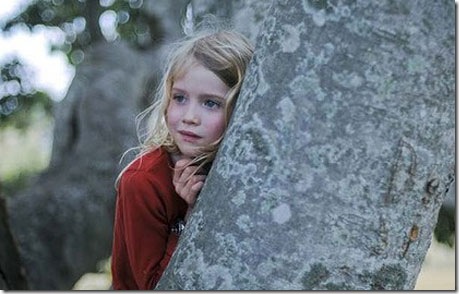We’ve barely been introduced to Peter O’Neill (Aden Young), the patriarch of a family of six in rural Australia, before a heart attack strikes him dead behind the wheel of his truck.
With his daughter playfully atop the vessel, and assuming her father is simply having some fun, the truck careens slowly off the road and teeters, with an anticlimactic thump, into the enormous fig tree adjacent to the family’s mobile home.
Like the beginning of a Six Feet Under episode, and to director Julie Bertuccelli’s great credit, the event is presented with restrained, dispassionate observation – the first sign that The Tree won’t be a film that settles for treacly melodrama. As emotions of mirth give way to panic and finally dread on the faces of Peter’s children, we understand that a half-dozen lives have changed, irrevocably, in an instant. What heretofore has been a sun-baked, ambling look at family’s relocation into a new environment becomes a bountiful study of grief, coping and hope in the wake of sudden tragedy.
The Tree is not a film of tear-stained funerals and long conversations about the sanctity and fragility of life. For a postmortem while, Bertuccelli lingers, perhaps a bit too heavily, on the loaded symbolism of wilted flowers, empty cowboy hats and sympathy cards that clutter the O’Neill’s abode, but the more the time transpires in the household, the more of an understanding we gain of the film’s dual (and sometimes dueling) protagonists: 8-year-old Simone (Morgana Davies, astounding in just her second screen role) and her mother Dawn (Charlotte Gainsbourg, the French chanteuse subdued in a wearied, appropriately numbed performance).
Simone deals with the film’s tragic events by taking refuge in the branches of that giant fig, where she believes her father is communicating with her through the susurrus of wind on its protracted branches. Skeptical at first, Dawn too finds comfort atop the tree, discussing her problems to her late husband in an act that justifiably strikes the neighbors as absurd.
When the tree, which begins to grow in unpredictable directions, punctures the O’Neill’s windows and invades their home, it’s as much a sign of Peter reaching out as the appearance of animals – a bat swooping toward a hanging light, frogs emerging from the toilet – that materialize inside like opaque messengers.
As Dawn moves beyond the past and forges a relationship with a scruffy local plumber (Marton Csokas, resembling a pleasant Dr. House), Peter remains a somewhat central character, especially if you subscribe to Eastern religions and dabble in pantheism. As The Tree takes on the grammar of a fable, the possibility of reincarnation is everywhere you look; even the owls and parrots Bertuccelli decides to show us take on an added spiritual dimension.
Then again, it all could be nothing. Never slip-sliding into mystical mumbo-jumbo, The Three shows us nothing beyond the physical; interpretations of transcendence lie with the viewer. It’s a more ambitious and sweeping film than Bertuccelli’s low-key feature debut, the Italian-language Since Otar Left, but emotionally the films are cut from the same cloth: Both analyze the lives of others following the death of one.
Critics have been spotting parallels with Terrence Malick’s The Tree of Life that are not entirely off-base, thanks to its similar title and nature-centric cinematographic beauty. Lacking formal pretense and aesthetic rigor, The Tree is a far more accessible venture, neither as daunting nor as unforgettable as Malick’s life-expanding tone poem.
But for most audiences, this is the better film and will remain one of the year’s most enriching movies for grown-ups.
THE TREE. Director: Julie Bertuccelli; Cast: Charlotte Gainsbourg, Morgana Davies, Marton Csokas, Penne Hackforth-Jones, Aden Young; Distributor: Zeitgeist; Rating: NR;
Playing now at Movies of Delray, Movies of Lake Worth, Living Room Theaters at FAU and Cinema Paradiso.
